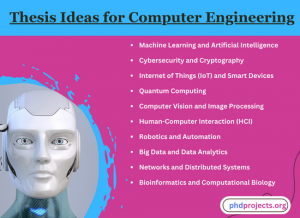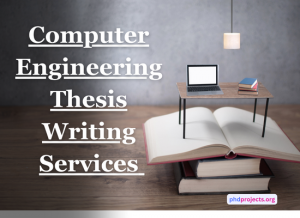Thesis Ideas for Computer Engineering
In the computer engineering domain, various concepts are emerging in recent times that assist in conducting research. We stay updated every day on changes in technologies sew identify the correct research gaps and share with scholar proper ideas and trending topics for all areas of computer engineering. The following are some thesis topics and plans relevant to computer engineering field that we consider:
- Machine Learning and Artificial Intelligence: In machine learning and AI, we explore novel techniques or approaches. This can be based on building fresh frameworks for particular works, enhancing previous methods, or implementing AI to new regions of interest.
- Internet of Things (IoT) and Smart Devices: Here, our work is to concentrate on the combination and interaction of IoT devices. Topics related to this domain can incorporate energy performance in smart devices, improving safety in IoT, or the building of novel kinds of IoT approaches.
- Computer Vision and Image Processing: Specifically for object identification, image recognition, or 3D modeling, we aim to enhance or construct novel techniques.
- Robotics and Automation: Our project concentrates on the pattern and application of robotic frameworks and that comprise various topics such as drone innovations, self-driving vehicles, or robotic process automation.
- Networks and Distributed Systems: In networking, we intend to investigate latest subjects, including the construction of more robust protocols, enhancing network safety, or advancements in distributed computing.
- Cybersecurity and Cryptography:, In the cybersecurity field, our project researches innovative approaches such as building more efficient encryption techniques or novel tactics for preventing cyber assaults.
- Quantum Computing: We involve more into the evolving domain of quantum computing. This consists of quantum computer framework, technique creation, or quantum computing applications.
- Human-Computer Interaction (HCI): To enhance the communication among computers and humans, we explore novel approaches like augmented reality, virtual reality, and user interface design.
- Bioinformatics and Computational Biology: Our work intends to implement computer engineering norms to the biology domain, including creation of techniques for examining biological data or framing complicated biological models.
- Big Data and Data Analytics: For managing, processing and examining extensive datasets, we investigate new techniques. This can incorporate data visualization, machine learning algorithms, or the creation of novel data analysis tools.

Keep in mind that a proper thesis topic must be practical within the objective and accessible materials in addition to be creative and intriguing. Also it is significant to examine the possibility and importance of the topic in the latest trending approaches.
What is a good research question for thesis?
For a computer engineering-based thesis, the creation of an effective research query incorporates finding a particular issue or passionate region within the domain, and designing a query that must be achievable as well as crucial. Appropriate research key word plays a major role it acts a good research question as it attracts the readers. Get our thesis writing services done from subject professionals, we handle it perfectly that abides by your academic standards. Below, we suggest some well-defined research queries related to computer engineering across different regions where we provide major assistance:
- Machine Learning and AI: How can machine learning algorithms be optimized for energy efficiency in mobile devices without compromising performance?
- Internet of Things (IoT): How can IoT devices be made more secure against distributed denial-of-service (DDoS) attacks without significantly increasing their cost or complexity?
- Computer Vision and Image Processing: Can deep learning techniques improve the accuracy of real-time object detection in varied lighting and weather conditions?
- Robotics and Automation: What are the challenges and solutions for implementing collaborative robots (cobots) in small and medium-sized manufacturing enterprises?
- Networks and Distributed Systems: What new models of distributed computing can effectively leverage edge computing for faster data processing in IoT networks?
- Cybersecurity and Cryptography: What are the effective strategies to detect and mitigate advanced persistent threats in enterprise networks?
- Quantum Computing: What are the practical limitations of implementing Shor’s algorithm in current quantum computing models, and how can these limitations be overcome?
- Human-Computer Interaction (HCI): How does the integration of augmented reality in educational software impact the learning outcomes in STEM subjects for high school students?
- Big Data and Data Analytics: How can big data analytics be used to predict and mitigate traffic congestion in urban areas effectively?
- Bioinformatics and Computational Biology: How can computational models be improved to more accurately simulate protein folding in complex organisms?
It is essential to make sure that your research query is explicit, concentrated, and realistic within the research goal while structuring it. The query must be more particular to be solvable within your research but also sufficiently wide to be aligned with realistic and educational passion. It will direct your study to dedicate novel perceptions and expertise to the computer engineering domain.

Computer Engineering Thesis Writing Services
phdprojects.org offers best Computer Engineering Thesis Writing Services, article writing, journal manuscript done by PhD professionals. We are a huge team of 100+ experts you can get your programming, code and simulation results with best explanation .More than 16+ programming languages ae well handled by our developers.
- Massive Multiple Access Based on Superposition Raptor Codes for Cellular M2M Communications
- Q-value Learning Automata (QvLA)-RACH Access Scheme for Cellular M2M Communications
- Class based dynamic priority scheduling for uplink to support M2M communications in LTE
- Modeling and Forecasting of Timescale Network Traffic Dynamics in M2M Communications
- Signal-Centric Predictive Medium Access Control for M2M Communications
- M2M meets D2D: Harnessing D2D interfaces for the aggregation of M2M data
- A lightweight framework for efficient M2M device management in oneM2M architecture
- Deriving Machine to Machine (M2M) Traffic Model from Communication Model
- Learning Automata Based Q-Learning RACH Access Scheme for Cellular M2M Communication
- System Behavior and Improvements for M2M Devices Using an Experimental Satellite Network
- Ad Hoc M2M communications and security based on 4G cellular system
- A dynamic access class barring scheme to balance massive access requests among base stations over the cellular M2M networks
- A GCICA Grant-Free Random Access Scheme for M2M Communications in Crowded Massive MIMO Systems
- Dimensioning approach to provision M2M services on legacy GPRS and UMTS Cellular Networks
- M2M communications: Enablement in 4G LTE, deployment considerations and evolution path to 5G
- A D2D cooperative relay scheme for machine-to-machine communication in the LTE-A cellular network
- Random Access Channel Management for Handling Massive Numbers of Machine-to-Machine Communication Device
- Energy Efficient Self-Reconfiguration Scheme for Visual Information Based M2M Communicatio
- Remote subscription management of M2M terminals in 4G cellular wireless networks
- A novel WiMAX ranging scheme for periodic M2M applications in smart grid
- Energy Efficient Resource Allocation for UAV-Served Energy Harvesting-Supported Cognitive Industrial M2M Networks
- Radio resource allocation in LTE-advanced cellular networks with M2M communications
- Signal-centric predictive polling for medium access control in M2M communications networks
- Low-Complexity Heuristic Algorithm for Power Allocation and Access Mode Selection in M2MNetworks
- Bit-interleaved polar-coded OFDM for low-latency M2M wireless communications
- A Novel Machine-to-Machine Communication Strategy Using Rateless Coding for the Internet of Things
- Regularity of movement based approach for M2M services discovery
- To random access or schedule? Optimum 3GPP licensed-assisted access for machine-to-machine communications
- Building communications system: Takenaka’s M2M platform for building management & application interface
- A Multi-Gbps, Energy Efficient, Contactless Data-Communication Link for Machine-to-Machine (M2M) Interaction with Rotational Freedom.
- Grouping Based Uplink Resource Allocation for Massive M2M Communications over LTE
- Exploiting Spatial and Temporal Correlations for Signal-Centric MAC in M2M Communication
- Power Control for Cognitive M2M Communications Underlaying Cellular With Fairness Concerns
- Wireless M2M Communication Networks for Smart Grid Application
- An energy-efficient scheme for WiFi-capable M2M devices in hybrid LTE network
- Service Characteristics-Oriented Joint ACB, Cell Selection, and Resource Allocation Scheme for Heterogeneous M2M Communication Networks
- Optimizing Data Aggregation for Uplink Machine-to-Machine Communication Networks
- Pattern Division Random Access (PDRA) for M2M Communications With Massive MIMO System
- Modeling and analysis for admission control of M2M communications using network calculus
- An energy efficient, fault tolerant and secure clustering scheme for M2M communication networks